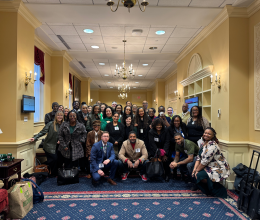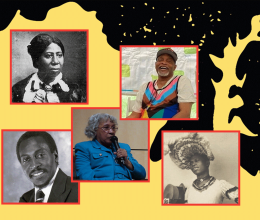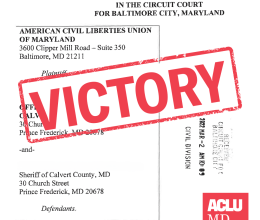Download the report, "Still Blocking the Exit"
New Report Features Stories of People Given Parole-Eligible Life Sentences Yet Denied Release
For Immediate Release
January 20, 2015
Contact
Meredith Curtis, ACLU of Maryland, 443-310-9946, curtis@aclu-md.org
Walter Lomax, Maryland Restorative Justice Initiative, 443-413-6076, waltermandalalomax@hotmail.com
ANNAPOLIS - Today, the Maryland Restorative Justice Initiative (MRJI) and the American Civil Liberties Union (ACLU) of Maryland released a new report, "Still Blocking the Exit," which tells the stories of many individuals given parole-eligible life sentences who have been denied release despite being recommended for it. The report was presented at a press conference in Annapolis, where advocates were joined by legislators sponsoring a bill to depoliticize the parole process for lifers. Also on hand were individuals released under the decision in Unger v. State of Maryland, which held that flawed jury instructions given by judges prior to 1980 denied defendants the right to a fair trial. Many of the individuals recently released - who often had parole-eligible life sentences - were sentenced as juveniles and are now successfully reintegrating into their communities.
"Real justice is restorative justice," said Walter Lomax, Founder and Director of the Maryland Restorative Justice Initiative. "These men's and women's lives, and their freedom, should not rely on who is in political office, or elected officials' philosophical or ideological beliefs, but rather on whether they have rehabilitated themselves."
The report includes stories from many of the 2,100 people are serving parole-eligible life sentences in Maryland, more than 340 of them for crimes committed when they were 17 or younger. These men and women were sentenced with the understanding that if they proved themselves genuinely rehabilitated they would be paroled. But, in fact, they are now more likely to die in prison, often after serving many more decades than anyone expected, than they are to be paroled. This is because Maryland's system is one of only three in the country where the Governor must approve parole for lifers, a process that has become highly politicized.
The result is that among this group of lifers are individuals who have been rehabilitated, who have done everything asked of them, who have sometimes even earned forgiveness and support of victims' family members and the Maryland Parole Commission, but who continue to languish in prison, at taxpayers' expense, until they die.
"Because of politics, Maryland is spending millions of dollars every year incarcerating people who can safely return to their communities, at great human and financial cost to us all," said Sonia Kumar, Staff Attorney at the ACLU of Maryland. "It is time to change that."
At the press conference, Senator Nathaniel McFadden and Delegate Curt Anderson (both D-Baltimore City) discussed legislation this session that would depoliticize the process governing what happens to those individuals given parole-eligible sentences and who are recommended for release. Senator Lisa Gladden and Delegate Jill Carter (both D-Baltimore City) are also lead sponsors.
"The legislation will restore faith in the system, giving those incarcerated incentive to change, and remove politics that unnecessarily waste taxpayers dollars that could be used other places, such as schools, recreation centers, and treatment programs," added Lomax.
# # #







